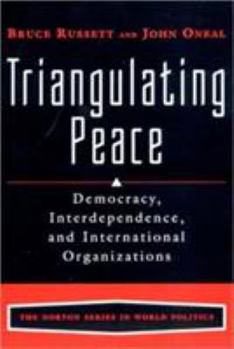Triangulating Peace: Democracy, Interdependence, and International Organizations
Triangulating Peace tackles today's most provocative hypothesis in the field of international relations: the democratic peace proposition. Drawing on ideas originally put forth by Immanuel Kant, the authors argue that democracy, economic interdependence, and international mediation can successfully cooperate to significantly reduce the chances of war.
Format:Paperback
Language:English
ISBN:039397684X
ISBN13:9780393976847
Release Date:December 2000
Publisher:W. W. Norton & Company
Length:394 Pages
Weight:1.30 lbs.
Dimensions:0.7" x 6.6" x 9.3"
Customer Reviews
1 rating
The Kantian Tripod of Peace
Published by Thriftbooks.com User , 22 years ago
Bruce Russett and John R. Oneal make a great contrubution to the epistemology of war and peace by Triangulating Peace. The book is about democracy, interdependence and international organizations. In Triangulating Peace, Russett and Oneal argue that democracy, economic interdependence and international organizations together lead to peace and they prevent war and/or conflict. They reach this conclusion after a well-studied statistical analysis that embraces all militarized inter-state disputes from 1885 to 1994. The data is gathered by the University of Michigan's Correlates of War Project. Russett and Oneal give many references to Kant's treatise on peace and even they label Triangulating Peace as the Kantian Peace. They argue that the Kantian Peace thesis is superior to democratic peace thesis. The three legs of Kantian peace, democracy, economic interdependence and international organizations generate virtuous cycles of peace in opposed to vicious cycles of war. These three factors also positively affect each other. However, the authors do not argue that all three factors have equal power in leading to peace. Economic interdependence has the most explanatory power while international organizations have the least one. How does democracy lead to international cooperation and peace? Russett and Oneal mention the factors of legitimacy, accountability, institutional checks and balances, transparency, and credibility of international agreements, through them democratic states produce patterns of cooperation and it leads to peace. Economic interdependence, on the other hand, creates processes of reciprocal attention and communication, perceptions of needs and responsiveness, and bonds of mutually rewarding transactions and feelings of community. Economic interdependence also increases the prospects for international peace throughout international trade. It generates security communities by creating sense of `we feeling' among cooperating states. It finally reduces the possibility of conflict. Like democracy and economic interdependence, international organizations also reduce the likelihood for conflict. International organizations and institutions teach set of norms that sharply revise states' conceptions of power. In sum, Russett and Oneal points out that the Kantian tripod for peace is the strongest pathway in reducing international conflict.Their statistical study also demonstrates that realist and liberal explanations of conflict/war are superior to Samuel P. Huntington's 'the clash of civilizations' thesis. In regard to current world politics, Russett and Oneal urge that incorporating Russia and China into the Kantian system will increase the prospects of a peaceful feature. They also urge that unilateral pattern of behavior for the U.S. would be dangerous for the future of international system while the U.S. multilateralism will make positive contribution to the world peace and stability. Overall, this book can be easily considered as a must





